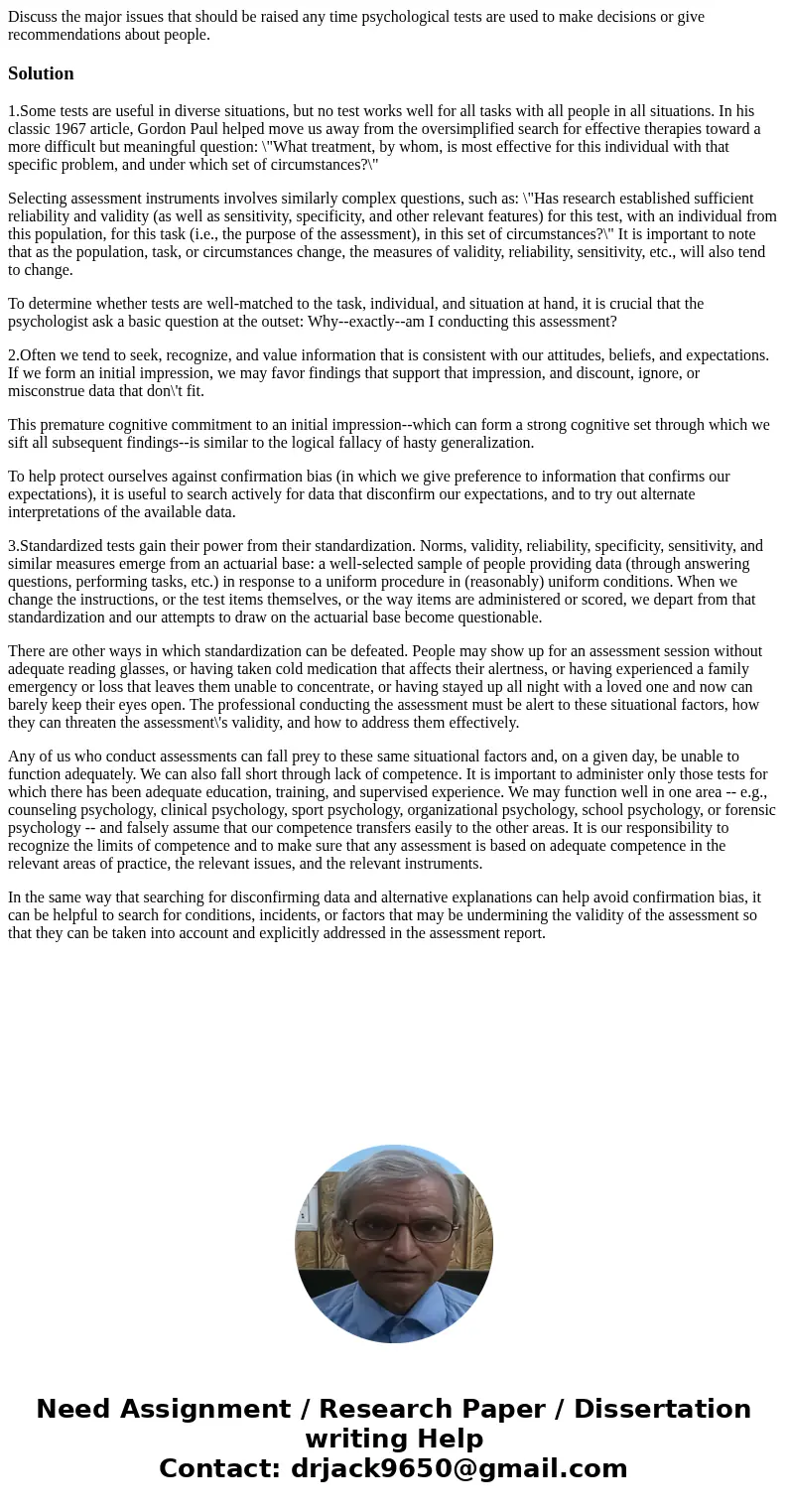Discuss the major issues that should be raised any time psyc
Discuss the major issues that should be raised any time psychological tests are used to make decisions or give recommendations about people.
Solution
1.Some tests are useful in diverse situations, but no test works well for all tasks with all people in all situations. In his classic 1967 article, Gordon Paul helped move us away from the oversimplified search for effective therapies toward a more difficult but meaningful question: \"What treatment, by whom, is most effective for this individual with that specific problem, and under which set of circumstances?\"
Selecting assessment instruments involves similarly complex questions, such as: \"Has research established sufficient reliability and validity (as well as sensitivity, specificity, and other relevant features) for this test, with an individual from this population, for this task (i.e., the purpose of the assessment), in this set of circumstances?\" It is important to note that as the population, task, or circumstances change, the measures of validity, reliability, sensitivity, etc., will also tend to change.
To determine whether tests are well-matched to the task, individual, and situation at hand, it is crucial that the psychologist ask a basic question at the outset: Why--exactly--am I conducting this assessment?
2.Often we tend to seek, recognize, and value information that is consistent with our attitudes, beliefs, and expectations. If we form an initial impression, we may favor findings that support that impression, and discount, ignore, or misconstrue data that don\'t fit.
This premature cognitive commitment to an initial impression--which can form a strong cognitive set through which we sift all subsequent findings--is similar to the logical fallacy of hasty generalization.
To help protect ourselves against confirmation bias (in which we give preference to information that confirms our expectations), it is useful to search actively for data that disconfirm our expectations, and to try out alternate interpretations of the available data.
3.Standardized tests gain their power from their standardization. Norms, validity, reliability, specificity, sensitivity, and similar measures emerge from an actuarial base: a well-selected sample of people providing data (through answering questions, performing tasks, etc.) in response to a uniform procedure in (reasonably) uniform conditions. When we change the instructions, or the test items themselves, or the way items are administered or scored, we depart from that standardization and our attempts to draw on the actuarial base become questionable.
There are other ways in which standardization can be defeated. People may show up for an assessment session without adequate reading glasses, or having taken cold medication that affects their alertness, or having experienced a family emergency or loss that leaves them unable to concentrate, or having stayed up all night with a loved one and now can barely keep their eyes open. The professional conducting the assessment must be alert to these situational factors, how they can threaten the assessment\'s validity, and how to address them effectively.
Any of us who conduct assessments can fall prey to these same situational factors and, on a given day, be unable to function adequately. We can also fall short through lack of competence. It is important to administer only those tests for which there has been adequate education, training, and supervised experience. We may function well in one area -- e.g., counseling psychology, clinical psychology, sport psychology, organizational psychology, school psychology, or forensic psychology -- and falsely assume that our competence transfers easily to the other areas. It is our responsibility to recognize the limits of competence and to make sure that any assessment is based on adequate competence in the relevant areas of practice, the relevant issues, and the relevant instruments.
In the same way that searching for disconfirming data and alternative explanations can help avoid confirmation bias, it can be helpful to search for conditions, incidents, or factors that may be undermining the validity of the assessment so that they can be taken into account and explicitly addressed in the assessment report.

 Homework Sourse
Homework Sourse